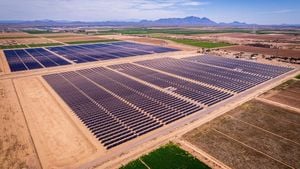The COP29 climate conference is now well underway in Baku, Azerbaijan, and the atmosphere, fraught with urgency and quite the bit of tension, reflects the gravity of the global climate crisis. Not only are negotiators from over 180 countries gathered to hash out the next steps for our planet, but they are doing so under the shadow of Azerbaijan's controversial reputation.
Azerbaijan, known for its substantial oil and gas reserves, presents a paradox as the host nation of COP29. While the country is preparing to host discussions pivotal to addressing climate change, critics argue its fossil fuel production undermines the very goals the conference aims to achieve. Simon Stiell, UN climate chief, has emphasized the pressing need for negotiators to “cut the theatrics” and focus on substantive agreements, primarily boosting financing for nations affected by climate disasters.
"We can't lose sight of the forest because we are tussling over individual trees," Stiell articulated, urging delegates to resolve less contestable issues early on to allocate necessary time for high-stakes discussions. With major political decisions looming, the call for urgency is palpable; the stakes for global climate finance are at their highest as developing countries seek support to adapt and transition to greener economies.
The underlying narrative this year, as raised by both Stiell and UN Secretary-General António Guterres, revolves around the ethicality and practicalities of financing climate initiatives among wealthier nations as they grapple with their historical role in the climate crisis. Guterres noted the need for large emitters to lead by example, saying, "Failure is not an option." The expectation is clear: immediate and actionable commitments are necessary as negotiations progress.
Yet, alongside the high-level discussions, youth voices have begun to penetrate the narrative at COP29. Climate-impacted children from different regions have passionately expressed their demands to be included at the negotiating tables. Zunaira from Pakistan, among the thousands of young-generated voices, articulated the cruel realities faced by children during climate disasters, such as floods and droughts. "When there are floods, resources become limited, and there aren’t enough for everyone," she remarked, highlighting the growing inequity exacerbated by climate-induced crises.
The urgency of the situation cannot be overstated, especially when the UNICEF estimates reveal nearly one billion children worldwide face health and educational setbacks driven by climate impacts. Youth advocates insist on their right to participation, pushing for dedicated conferences focused on their unique challenges and perspectives—a demand echoed loudly throughout youth-led events at the conference.
While the conference presses on with planned engagements around climate issues, another narrative is budding, highlighting the increasingly authoritarian nature of Azerbaijan's regime. Human Rights Watch reports have documented a disturbing trend: significant crackdowns against activists and media, especially those voicing dissent against government policies. With dozens of activists and journalists detained on dubious charges since Azerbaijan was announced as the COP29 host, the atmosphere remains charged with risk and fear for local advocates.
“Azerbaijan has had an abysmal rights record for many years, but it has dramatically deteriorated as we near COP29,” said Giorgi Gogia, associate director of Human Rights Watch, expressing deep concerns over the suppression of voices critically needed at such pivotal discussions. Accusations against activists have included the misuse of laws aimed at silencing critics and curtailing freedoms—an environment deemed unfriendly for constructive dialogues necessary for achieving sustainability on the world stage.
The backdrop to this climate conference becomes even more complicated when discussing Azerbaijan's use of its fossil fuel wealth to assert dominance both regionally and globally. Historically, the country has utilized its resources to shift narratives around governance and civil rights abuses. Critics point fingers at President Ilham Aliyev's regime, which has operated for decades with little regard for dissent, often branding opponents as traitors or engaging them under legal structures deemed repressive.
The irony of the oil-rich nation hosting this summit raises important questions: Can real commitment to solving climate change flourish under such oppressive regimes, or does the conference serve as mere window dressing for their actions? Some activists, including global figures like Greta Thunberg, have chosen to boycott the talks, citing Azerbaijan as “a repressive state,” thereby painting the COP29 narrative with shades of disillusionment and resistance.
From calls for effective climate action to demands for human rights accountability, COP29 is quickly becoming a battleground not just for climate negotiations but also for moral clarity. Discussions extend beyond simply financial mechanisms and agreements; they highlight the ethical intersections between climate justice and social justice, urging participants to hold to account those benefiting from the status quo.
While the negotiations continue, many participants and observers hope for credible resolutions to emerge from Baku's intense discussions. It is clear, though, the echoes of the past cannot be ignored: any solutions must tread carefully through the murky waters of politics, the pressing backwardness of human rights, and the increasingly visible climate crises facing vulnerable communities.
Despite the rollercoaster of political theatrics, the core message remains: urgent action is necessary now. COP29's outcomes could very well influence the global direction of climate policy, potentially setting pathways for climate justice or reinforcing existing disparities. The world’s leaders must take heed. Will they cooperate to forge realistic plans? Or will they fall prey to political gamesmanship, failing to prioritize the cohesive action required to combat the irreversible impacts of climate change?



